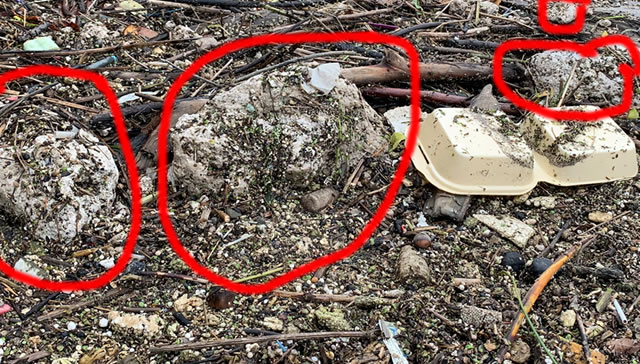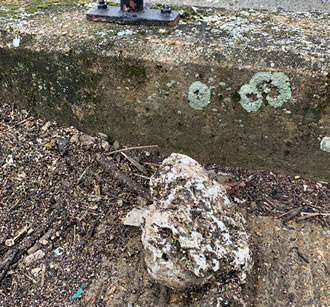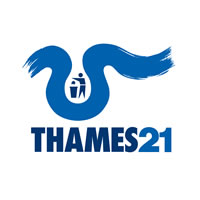Volunteers from Putney and Barnes report fatbergs along the Thames

Not cement but congealed fats on Barnes Small Profits Dock
|
Local volunteer groups in Putney Tidy Towpath (PTT) and Barnes Tidy Towpath Group (BTTG) have reported collecting fatbergs with the litter last weekend along the Putney foreshore and at Small Profit Dock in Barnes.

Fatbergs are blocks of hardened fat, oil which has been put into the drainage system and set around wet-wipes, sanitary towels and other rubbish flushed into the drains from toilets.
The bergs have been released into the Thames from the drainage system with the
combined sewage overflow Tuesday afternoon (24 September) following heavy rainfall.
A spokesperson for BTTG said: "Following the combined sewage overflow, fatbergs and other nasty bits washed up on Small Profit foreshore and ramp in Barnes. Fatbergs look like chunks of concrete but despite their weight, they are weirdly crumbly, squidgy and contain items which have been flushed down the loo. This weekend, fatbergs were reported in Putney, Hammersmith, Barnes and Mortlake by clean up groups who also found numerous dead rats which was most unusual. We suspect the rats may have been drawn to the smell of the fat, consumed some of the fatberg and died as a result of eating the contaminated matter. Clearly, a hazard for pets, marine life and the environment!"
A spokesperson for PTT said: "Congealed within these lumps can be anything - including a hypodermic needle found in one at Small Profits Docks, dogs on the foreshore cannot tell what is with the lump they try to eat. We urge
residents not to “feed” fatbergs by pouring fat, oil, grease down your kitchen drains and not to flush anything but the 3 P's down the loo - Pee poo and paper - wet wipes, earbuds, condoms and sanitary towels etc should all go on the bin!"
Medivet in Barnes report that eating bits of fatberg can make dogs very sick with diarrhoea and vomiting, but this should not be fatal. However, the consumption of one of the many dead rats we’ve been seeing increases the chances of Weill’s/leptospirosis which is very serious.
Both group are trained by Thames21 a charity that works with communities across Greater London to improve rivers, canals, ponds and lakes for people and wildlife. A spokesperson for Thames21 said: "The public are confused by inaccurate wet wipe labelling and urged to buy them for every occasion. Which means that millions of wet wipes (which usually contain plastic and/or persistent chemicals) are still being flushed down loos – causing fatbergs, and ending up in our rivers when the sewers can’t cope. Our rivers are being turned into plastic rubbish dumps.

"Wet wipe plastic breaks down into tiny pieces which pose a risk to people's health because they can get into our food and water. Three things need to happen:
1. We all need to Bin Don't Flush (no matter what it says on the packet)
2. Politicians need to ban inaccurate wet wipe labelling
3. As a society we can all start to move towards reusable alternatives rather than single use plastic products where possible. Let’s go ‘Reusable for Rivers’".
Hammersmith & Mogden Treatment Centres have both discharged untreated sewage into the Thames in the past 24 hours.
October 3, 2019